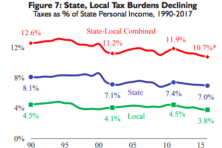The Art of Taxes
- Share
- Tweet
- Pin
- Share
A quick disclaimer: I pride myself on being an expert on many things (indie rock, where to get a great Caesar salad), but taxes is most definitely not one of them. Tax season used to be a time of joy for me – while my parents were hemming and hawing over receipts and those novella-sized 1040 forms, I was blissfully calling the local Telefile number and collecting my hundreds of dollars in state and federal tax return money.
So, when the Pulse asked to me to write an article about tax tips for artists, I went directly to the source – artists. The names of my artist friends haven’t been used because, well, they aren’t experts at taxes either. However, they did have some great advice that I thought I’d share with the readers of the Pulse – among our readers there might be an artist just starting out, or a seasoned artist that might not be aware of some of these practices.
As one artist mentioned, taxes for an artist also include his or her taxes in real life. If an artist is just starting out, there’s a good chance that they may have a full- or part-time job and create their art in their spare time. However, if you make more than $600/year annually with your artwork, you should obtain a tax ID number. This means that you should be paying sales tax on any sales that are made directly to a consumer. If you are in this boat, you are what is called a sole proprietor, meaning that all of your business and personal income is combined into one come tax filing time.
Even if your art isn’t a full-time endeavor, it is always good to keep impeccable records – and part of keeping great records means, as another artist put it, “documenting until you drop.” There are many items that are tax-deductible: materials, supplies, travel to art shows and to get supplies, entertainment or meals associated with clients, and any educational expenses, as well as other things that make you able to run your business, such as Internet, phone, utilities, computers, and rent.
One artist advises having a business checking account, savings account, and credit card in addition to one’s personal banking accounts. This way, if your studio is also in the same place as your home, you can pay your utilities and rent out of the business account. “Figure out the square footage of your whole space, and the percentage of space that is allocated to your studio, studio storage, and office. Depending on how much space you use for your art, up to 50 percent of those expenses can be deducted,” she says. Another artist could not stress enough the importance of documentation in general – “get an envelope or a wife that is much better than you at all of this, and save ALL OF YOUR PAPER.”
The top piece of advice the artists stressed is the importance of a quality accountant. “It is worth whatever money you need to pay,” says one. “Your accountant will save you time and stress, and they will know the tax loopholes, so you don’t have to.” It also helps if, same as people filing their personal taxes, they have an accountant that is the same from year to year. If they know your financial situation over the long term, your accountant can give you advice on how to improve for the next tax year, whether it has to do with your record-keeping skills or something that you didn’t realize you could deduct.
The item that surprised me the most was how artists need to handle donations for events (i.e. if an artist donates something for a fundraiser – as a silent auction item, etc.). Having asked many an artist for a donation as part of non-profit fundraisers in the county, I had incorrectly assumed that if an artist donated a piece of work, they could deduct the value of the donated work from their taxes. More than one artist was quick to correct me. “This was something I actually just learned,” says one. “I had no idea that you couldn’t deduct the full value of the piece. Artists can only deduct the cost of materials. So, even if I donate a piece that someone would buy in my gallery for $120, I can only deduct about $60 of that.” Most artists are quick to say that even though the full value can’t be deducted, they still are more than happy to donate to local non-profits. “It’s a good way for me to contribute, and it does give me exposure in the community,” says one.
Most of the artists I talked to share a sentiment similar to most other people – that, at the end of the day, taxes are just part of life. “Just make money and keep good records,” says one. “Your accountant will take care of the rest.”

